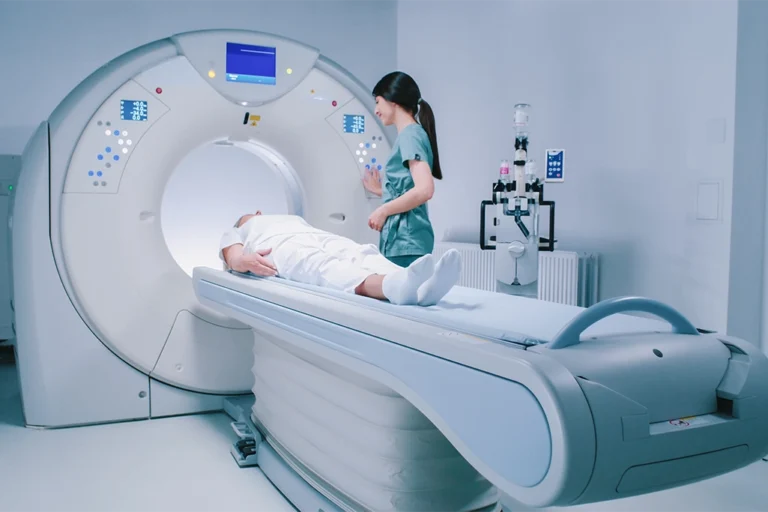If your doctor has recommended you get a lung CT scan, you might wonder why. A lung CT (computed tomography) scan is capable of detecting a number of chest infections, injuries, or diseases. Your doctor recommended this particular scan if they are concerned that your health is at risk for one of these infections, injuries, or diseases.
If you have any of the following symptoms, they will likely recommend you get a CT scan:
- Chest pain
- Chest tightness
- Shortness of breath
- Cough
- Smoking
- Vaping
- Trouble blowing air
- Wet cough
- Persistent cough
- Low blood oxygen levels
- High blood pressure
*Experiencing one of these symptoms does not mean that you have a lung issue
Why Would My Doctor Order A Lung CT Scan?
If you are a routine smoker, talk to your doctor about having an annual lung cancer screening. If you are not a regular smoker, your doctor might recommend you get routine scans for another reason, maybe to monitor treatment or tumor growth. It’s important to remember that some lung and breathing problems could be life-threatening. CT scans are expensive, but they are cheaper and faster than other medical scans and can make all the difference in your health journey.
A lung CT scan is capable of detecting any of the following:
- Benign or malignant tumors
- Pneumonia
- Tuberculosis
- Cystic fibrosis
- Inflammation of the pleura
- Chronic lung disease
- Congenital abnormalities
- COVID-19
- Lung cancer
- COPD
- Asthma
- Heart problems (clogged arteries, congestive heart failure, etc.)
*Just because your doctor has recommended a chest CT scan doesn’t mean you have one of these diagnoses – it just means your doctor wants more information
CT scans are the best scans for people who need routine scans (this is the best option for smokers). CT scans are also doctors’ preference for diagnosing other lung issues over MRI (magnetic resonance imaging). CT scans are fast and effective for discovering abnormalities, diagnosing respiratory issues, and screening for lung cancer.
If your doctor has recommended a CT scan, they might be worried you have lung cancer. The symptoms of stage 1 lung cancer are a new, persistent cough, chronic, worsening cough, coughing up bloody mucus, shortness of breath, ongoing chest pain, and frequent lung infections. CT scan results associated with lung cancer are abnormal white areas on your lungs – these are lung nodules. While a CT scan is capable of detecting lung nodules, CT results alone are not able to diagnose and stage cancer. If your results show lung nodules, your doctor will recommend a tissue biopsy to check if the nodules are benign or cancerous.
Oftentimes lung cancer is diagnosed at stages 3-4. When it comes to lung cancer, CT scans are relatively accurate but remember: a CT scan alone cannot diagnose cancer, it must be done in conjunction with other tests and biopsies. CT scans miss lung cancer about 5% of the time. For this reason, a CT scan alone cannot rule out cancer. Some cancers, like liver, prostate, and uterine cancers, cannot be detected by a CT scan. However, for lung cancers, a CT scan is the recommended scan.
How Do I Prepare For A Lung CT Scan?
Try to arrive 10-15 minutes early to your appointment just in case you have any questions or if you need to change before your appointment. You might have to put on a hospital gown. During your scan, you will lay on your back on a metal bed, and the CT machinery will move around you. Your appointment will take about 30 minutes. After your appointment, you will be able to leave immediately. If you are getting a chest CT scan with contrast, arriving early will be helpful since you will need to ingest or be injected with the contrast material ahead of your scan.
Your doctor will analyze your lung CT results to assess the cause of your symptoms or check up on your lungs (routinely, if you’re a smoker), or monitor treatment. Because a chest CT images your lungs, esophagus, and heart, there are a lot of issues your doctor could find potentially concerning. Some cancers aren’t visible on a CT scan, but these cancers are not lung cancer, which is easily visible on a lung or chest CT scan.
Your doctor will have your CT results within 24 hours. They will schedule a follow-up appointment to discuss your results and create a treatment plan if necessary. Normal lung CT results show the lungs as totally black. Abnormal results would show small, abnormal white spots or areas. However, those areas could be something as simple as a benign lung nodule. In one study, more than half of the CT scans will have at least one lung nodule, and approximately 96% are not cancerous. No medical scan is perfect, but CT scan results are approximately 87% accurate. CT scans can sometimes offer false positives or false negatives. Thankfully, your doctor has other information and testing that will help catch these and give you an accurate diagnosis.
Getting a CT scan can be nerve-wracking. We want to help make the process as comfortable as possible. At South Jersey Radiology, we are committed to bringing you excellent care at lower costs. Call us today to schedule an appointment at any of our following locations:
- Haddonfield Office – Haddonfield, NJ
- Marlton (Greentree) Office – Marlton, NJ
- Medford Office – Medford, NJ
- Moorestown Office – Moorestown, NJ
- Mount Laurel Office – Mount Laurel, NJ
- Route 73 (Voorhees) Office – Voorhees Township, NJ
- Turnersville Office – Turnersville, NJ
- Voorhees (Carnie Blvd) Office – Voorhees Township, NJ
- Sewell (Washington Twp) Office – Sewell, NJ
- West Deptford Office – West Deptford, NJ
- Willingboro Office – Willingboro, NJ
Learn more about the board-certified, subspecialized radiologists who read and interpret studies at SJRA, here.
Frequently Asked Questions
Your doctor may have recommended a lung CT scan for various reasons. If you are a routine smoker, they might suggest an annual lung cancer screening. For non-smokers, routine scans may be recommended to monitor treatment or tumor growth. Lung and breathing problems can be life-threatening, and CT scans are a cost-effective and efficient way to detect abnormalities and provide important information for your health journey.
A lung CT scan is capable of detecting several conditions, infections, and diseases, including benign or malignant tumors, pneumonia, tuberculosis, cystic fibrosis, inflammation of the pleura, chronic lung disease, congenital abnormalities, COVID-19, lung cancer, COPD, asthma, and heart problems such as clogged arteries and congestive heart failure. It’s important to note that the recommendation for a lung CT scan does not mean you have any of these diagnoses; rather, it signifies that your doctor wants more information to assess your condition accurately.
CT scans are the preferred option for routine scans, particularly for smokers. They are also the preferred choice for diagnosing various lung issues compared to MRI (magnetic resonance imaging). CT scans are fast and effective in identifying abnormalities, diagnosing respiratory issues, and screening for lung cancer.
During the scan, you will be asked to lie on a bed, and the CT machinery will move around you. The scan typically takes about 20 – 30 minutes. If you are getting a chest CT scan with contrast, you may need to arrive early to receive the contrast material orally or intravenously before the scan. After the scan, you can leave immediately. Your doctor will receive the results within 24 hours and schedule a follow-up appointment to discuss the findings and create a treatment plan if necessary.
CT scan results are approximately 87% accurate. While normal lung CT results show the lungs as entirely black, abnormal results may show small, abnormal white spots or areas. However, it’s important to note that many of these areas can be benign lung nodules. False positives or false negatives can occur with CT scans, but your doctor will consider other information and tests to ensure an accurate diagnosis.
To schedule a lung CT scan, you can contact any of our conveniently located offices below:
• Haddonfield Office – Haddonfield, NJ
• Marlton (Greentree) Office – Marlton, NJ
• Medford Office – Medford, NJ
• Moorestown Office – Moorestown, NJ
• Mount Laurel Office – Mount Laurel, NJ
• Route 73 (Voorhees) Office – Voorhees Township, NJ
• Turnersville Office – Turnersville, NJ
• Voorhees (Carnie Blvd) Office – Voorhees Township, NJ
• Sewell (Washington Twp) Office – Sewell, NJ
• West Deptford Office – West Deptford, NJ
• Willingboro Office – Willingboro, NJ
Our team of board-certified, subspecialized radiologists reads and interprets all our CT scans. Our experienced radiologists ensure accurate and thorough analysis of your lung CT scan to aid in diagnosis and treatment planning. Learn more about our radiologists by visiting our physician profiles.




